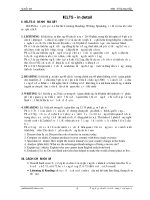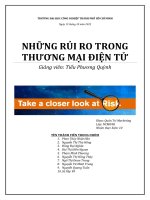Inversion in Englíh
Bạn đang xem bản rút gọn của tài liệu. Xem và tải ngay bản đầy đủ của tài liệu tại đây (67.25 KB, 8 trang )
Inversion In English
In this case, the question form (auxiliary + subject + main verb) takes the
place of the standard positive sentence structure (i.e. He goes to work every
day)
Seldom has the boss been so upset!
Các cấu trúc đảo ngữ dợc sử dụng thờng xuyên và rộng rãi nhất.
1. Đảo ngữ trong 1 số trờng hợp câu phủ định.
( Inversion in nagative sentences)
a. Một số trạng từ phủ định đứng đầu câu.
Hardly (ever)
Barely
Scarely (ever) + Inversion
Rarely
Never again/ before
Never
Seldom
Little
barely
You can hardly see anyone wear a hat nowadays.
scarely
Barely
--> Hardly can you see anyone wear a hat nowadays.
Scarely
(Ngày nay bạn khó mà trông thấy ai đội nón)
Such a situation should never be allowed to arise again
--> Never again should such a situation be allowed to arise.
(Không bao giờ tình huống nh thế đợc phép dấy lên nữa.)
The thief little realized that the police had thrown a cordon
around the bank.
--> Little did the thief realize that the police had thrown a cordon around
the bank.
(Hầu nh tên trộm không nhận ra rằng công an đã xiết chặt vòng vây xung
quanh ngân hàng)
This remedy rarely failed
Công thức:
Adverb
adverbial phrase + V + S + ......
Clause Auxiliary V V
--> Rarely did this remedy fail
Hardly/ Scarely ever did they manage to meet unobserved
I had never before been asked to accept a bribe.
-->Never before had I been asked to accept a bribe.
Little did he understand the situation.
Little have I read concerning nanotechnology.
Never have I been more insulted!
Seldom has he seen anything stranger.
Never does he go to the cinema.
Seldom did he sing
Rarely do we agree with each other
Scarcely had I got out of bed when the doorbell rang.
b. Đảo ngữ trong câu bắt đầu bằng Not
She didn t shed a tear even though the story ended in tragedy.
--> Not a tear did she shed even though the story ended in tragedy.
(Đến một giọt nớc mắt cô ta cũng không nhỏ ra mặc du câu chuyện kết thcs
trong bi kich.)
The whole truth didn t become known un til many years later.
--> Not until many years later did the whole truth become known.
(Mãi tới nhiều năm sau toàn bộ sự thực mới đợc ngời ta biết đến)
I didn t realize how difficult the exercise was until I was half way
through it.
--> Not until I was half way through the exercise did I realize how difficult
it was.
( Mãi đến khi tôi làm đợc nửa bài tôi mới nhận ra là bài khó)
He didn t realize that he had lost it till he got home
--> Not till he got home did he realize that he had lost it.
Note:
Tuy nhiên trờng hợp cụm danh từ bắt đầu bằng No hoặc Not làm chủ ngữ
trong câu thì không gọi là đảo ngữ.
No example of this word is given in this dictionary.
(Cuốn từ điển này không đa ra ví dụ nào về từ này.)
Mặt khác với Not until + clause thì đảo ngừ ở vế cau chính chứ không phải
lấy ở vế ngau sau Not until
Not + noun phrase
Not + till + phrase + Inversion.
Not + until + clause.
c. Đảo ngữ với cấu trúc Not only.............. but also..............
She dances beautifully and she sings sweetly, too.
--> Not only does she dance beautifully but she also sings sweetly.
(Không nững cô áy nhảy đẹp mà còn hát hay.)
Not only do I enjoy classical music, but I also have a season ticket to
the symphony
d. Đảo ngữ với các cụm từ co No, Not đứng đầu câu.
Under no circumstances
In no circumstances
On no condition
On no account
At no time + Inversion
Nowhere
In no way
No longer
The bus driver can t be blamed for the accident in any way.
--> In no way can the bus driver be blamed for the accident.
( Trong bất cứ trờng hợp nào cũng không đợc đổ lỗi vụ tai nạn cho ngợi lái
xe buýt.)
The doctor told his patient that he should on no account return to
work un til he had made a complete recovery.
--> The doctor told his patient that on no account should he return to work
until he had made a complete recovery.
(Bác sỹ nói với bệnh nhân trong bất cứ trờng hợp nào ông ta cũng không đợc
làm việc cho đến khi ông ta hồi phục hoàn toàn.)
Remote villages don t have a regular bus service any longer.
--> No longer do remote villages have a regular bus service
(Các làng quê xa xôi hẻo lánh không còn dịch vụ xe buýt đều đặn nữa)
The accused never expressed regret for what he d done.
--> At no time did the accused express regret for what he d done.
(Cha bao giờ kẻ bị buộc tội hối tiếc vì những gì hắn đã làm)
This switch must not be touched on any acount
--> On no acount must this switch be touched.
Nowhere will you find better roses than these.
2. Đảo ngữ trong cấu trúc có Only
Not only + clause (đảo ngữ) + but + S + also + V
a.
You can make yourself heard only by shouting at the top of your voice.
--> Only by shouting at the top of your voice can you make yourself heard.
( Chỉ có hét to hết sức thì ngời ta mới nghe thấy bạn nói gì.)
The facts were not all made publicity until later.
--> Only later were the facts all made publicity.
( Chỉ mãi tới sau này thì thực tế đó mới dợc phơi bày trớc công chúng)
He mentioned it to me only yesterday
--> Only yesterday did he mention it to me.
( Mãi tới hôm qua anh áy mới đề cập tới chuyện đó.)
Only after understanding the situation does the teacher make a comment.
b.
You will understand what true responsibility is only when you became
a parent.
--> Only when you become a parent will you understand what true
responsibility is.
( Chỉ khi bạn trở thành ngời cha ngời mẹ thì bạn mới hiểu trách nhiệm đích
thực của họ là gì.)
You can enter the competition to meet the cast noly if you purchase a
ticket for a show.
--> Only if you purchase a ticket for a show can you enter the competition to
meet the cast.
(Nếu bạn mua vé thì bạn mới gặp đợc các diễn viên.)
We realized, only then, what a mess we had got ourselves in.
--> Only then did we realize what a mess we had got ourselves in.
( Mãi đến sau này chúng tôi mới nhận ra sự bừa bộn cẩu thả khi chúng tôi b-
ớc vào)
Only then did I understand the problem.
noun phrase
Only prepositional phrase + Inversion
later
(only by, only after, only in this way)
if (clause)
Only when (clause) + Inversion
then
Note:
Nếu Only ám chỉ tình trạng duy nhất thì không sử dụng đảo ngữ.
Ex. Only Mary realized that the door was unlocked.
( Chỉ có Mary nhận ra cửa không khóa.)
3. Đảo ngữ với các cụm từ thời gian.
Dùng để diễn tả hành động diễn ra ngay sau 1 hành động khác. Thờng
thì những hành động đó đêu ở quá khứ.
Công thức:
No sooner had he put down the receiver with a great sign of relief than the
phone rang again.
(Anh ta vừa thở phào nhẹ nhõm đặt ống nghe xuống thi chuông điện thoại lại
reo)
Hardly/ Scarely/ Barely had the train left the station when there was a
terrible explosion.
No sooner had he finished dinner, when she walked in the door.
He had no sooner drunk the coffee than he began to fell drowsy
--> No sooner had he drunk the coffee than he began to feel drowsy.
Note:
Đi với các cấu trúc trên có thể dùng cả các thơì khác nhng không nhiều. ý
nghĩa của các hành động trong mãu phải mang tính đối lập.
4. Đảo ngữ trong các nhận xét để diễn đạt sự hợp ý.
Sử dụng các liên từ so/ neither/ nor ............ với đảo ngữ của động từ
chính. Chúng đợc dùng trong câu trần thuật để rút gọn lời nói, tránh lặp lại các
ý kiến đã đợc đa ra từ trớc.
Cấu trúc:
Jack went out last night and we went out last night, too.
--> Jack went out last night and so did we.
Hardly
Scarely
Barely
Inversion
(past perfect)
when
(past simple)
No sooner than
Statement
Affirmative sentence
(and)
so + inversion
Nagative sentence neither + inversion
nor









